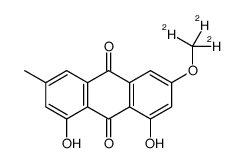1215751-27-1
| Name | 1,8-dihydroxy-3-methyl-6-(trideuteriomethoxy)anthracene-9,10-dione |
|---|---|
| Synonyms |
6-(Methoxy-d3)chrysophanic Acid
Parietin-d3 6-O-Methylemodin-d3 1,8-Dihydroxy-3-methyl-6-(methoxy-d3)anthraquinone Emodin 3-(Methyl-d3) Ether Rheochrysidin-d3 Physcion-d3 |
| Description | Physcion-d3 (Parietin-d3) is the deuterium labeled Physcion (HY-N0108). Physcion acts as an inhibitor of 6-phosphogluconate dehydrogenase, with an IC50 and a Kd of 38.5 μM and 26.0 μM, respectively. Physcion exhibits laxative, hepatoprotective, anti-inflammatory, anti-microbial, anti-proliferative and anti-tumor effects[1][2][3]. |
|---|---|
| Related Catalog | |
| In Vitro | Stable heavy isotopes of hydrogen, carbon, and other elements have been incorporated into drug molecules, largely as tracers for quantitation during the drug development process. Deuteration has gained attention because of its potential to affect the pharmacokinetic and metabolic profiles of drugs[1]. |
| References |
| Molecular Formula | C16H9D3O5 |
|---|---|
| Molecular Weight | 287.28200 |
| Exact Mass | 287.08700 |
| PSA | 83.83000 |
| LogP | 2.19020 |
